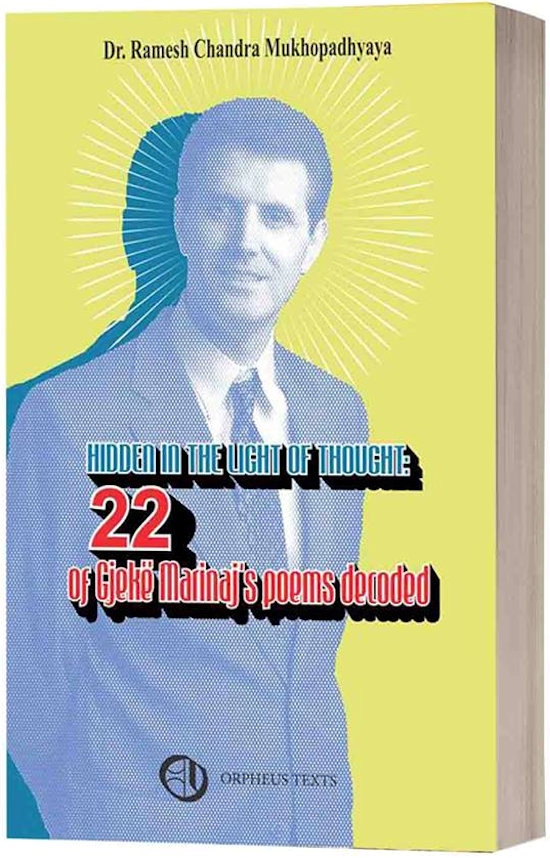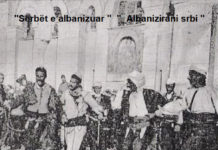DEKODIMI I 22 POEZIVE TË GJEKË MARINAJ
Gjekë Marinaj
Thank you, Dr. Ramesh Chandra Mukhopadhyaya!
Të dashur miq,
Kur takoj një koleg për herë të parë nëpër konferenca shkencore apo letrare, vetëm për pak minuta, dhe katër vjet më vonë më mbanë mend emrin, ndjehem vërtet i lumtur. Kur takoj dikë në evenimente të tilla për herë të parë, vetëm për pak minuta, dhe katër vjet më vonë ai apo ajo më dhuron një libër, I gëzohem shumë suksesit të autorit. Por nuk më ndodh shpesh që të takoj për herë të parë, vetëm për pak minuta, një Doktor në Filozofi, Studiues dhe shkrimtar të famshëm botëror, që pas katër vjetësh të më japin në dorë librin e tij, por që ky libër është një zbërthim shkencor i poezisë time që ka emrin tim dhe fotografinë time në ballinë. Ky njeri i madh është Dr. Prof. Ramesh Mukhopadhyaya. Ngaqë fuqia e fjalëve për të shprehur mirënjohjen time ndaj tij është e kufizuar, ju lutem më ndihmoni ta uroj për punën e tij kolosale në dekodimin e jashtëzakonshëm shkencor të poezisë time në këtë libër. Për më tej, me lejen e tij, po vë këtu ballinën dhe hyrjen e librit. Ndjehem me shumë fat që ju, miqtë e mi, e kuptoni se libri është i tij dhe se çdo koment apo vlerësim i takon atij e jo mua. Ju falënderoj për miqësinë shumë të çmua që mbani me mua.
Bạn thân mến,
Tôi cảm thấy thực sự hạnh phúc khi lần đầu tiên gặp đồng nghiệp trong các hội thảo khoa học hoặc các sự kiện văn học, chỉ trong vài phút, và bốn năm sau người ấy vẫn nhớ tên tôi. Khi tôi gặp ai đó tại các sự kiện như vậy lần đầu tiên cũng chỉ trong vài phút, và bốn năm sau anh hoặc chị ấy đưa cho tôi cuốn sách, tôi rất vui mừng vì thành công của tác giả. Nhưng điều ấy chưa bao giờ xảy ra với tôi trước đây. Nhưng lần đầu tiên, gặp tôi chỉ trong vài phút, Tiến sĩ Triết học – nhà nghiên cứu – nhà văn nổi tiếng, người sau bốn năm gặp lại tôi (ở Việt Nam) đã tặng tôi cuốn sách của ông ấy, không phải bất kỳ tác phẩm nào, mà chính là cuốn sách giải mã thi pháp thơ của tôi, có tên và hình ảnh của tôi bên cạnh tên của ông trên trang bìa. Người đàn ông tuyệt vời này là Tiến sĩ – Giáo sư Ramesh Mukhopadhyaya. Bởi khả năng hạn hẹp của ngôn ngữ khó có thể biểu cảm hết lòng biết ơn của tôi tới ông, xin các bạn hãy giúp tôi chúc mừng ông ấy vì công việc to lớn, đó là giải mã thi pháp phức tạp của thơ tôi. Được ông ấy cho phép, tôi xin đăng lên đây trang bìa và lời giới thiệu cuốn sách của ông ấy. Tôi cảm thấy rất may mắn khi bạn, cũng như những người bạn thân yêu của tôi hiểu rằng, cuốn sách này chỉ có một mình ông ấy đã viết những lời bình chú tích cực. Và lời chúc mừng chân thành dành cho ông ấy nên là của bạn chứ không phải tôi. Tôi cảm ơn bạn vì tình bạn vô cùng quý giá đã đồng hành cùng tôi trên facebook này.

INTRODUCTION
By Dr. Ramesh Chandra Mukhopadhyaya
Heisenberg’s theory of indeterminacy presumes that electrons, the basic constituents of the multiverse, are, at their core, random. They have no pattern. So chances and accidents are perhaps recurrent phenomena in human life. There is love at first sight and hatred at first sight. And one cannot guess which seed grows and which seed does not. But every meeting may have great promise.
I met poet Gjekë Marinaj at the Asia Pacific Poetry Meet in Vietnam in 2015. When I asked if he writes poetry, he presented me with a sheaf of his poems, and then vanished among the crowd of poets gathered in the Army Hotel in Hanoi. I was taken by surprise with the gift of poems. Ordinarily, poets present fellow poets and readers with their books, but here were typed manuscripts handed over without much ado. For a week or so, I found Marinaj moving about with youthful vivacity, meeting poets in the crowd. One afternoon we met, and he told me that he propounded an aesthetic of his own called Protonism Theory. For him, every poem is an atom, complete in itself. And why did he preach Protonism? He told me that he was concerned with the literary criticism of the Balkans, and that present-day critics have crossed the barriers of morality and revel in frank sensuousness. Marinaj’s Protonism Theory seeks to change this unruly behavior of poetry. He appears to be a leader who dares to stand against the fashion of the day. It simply shows that, like Marinaj, poets should be teachers.
Intertextuality and intersubjectivity can be espied among the myriad of texts. Each text is complete in itself, despite being unknowingly connected with others. This is because we learn language from society and elsewhere. Leave a child penned up in a room away from human society: Will he ever learn to speak a language? No. And if we go deeper, string theory (“the theory of everything”) comes to our aid. Everything is a string, and they are being played. String theory looks upon existence as a cosmic symphony. Where is the room in this symphony for a poem to become exclusive and complete in itself? Each poem on the surface is unique. Every poet on the surface is distinct from others. Difference is the important part of creation.
And how does Marinaj look upon creation? It is simply a crowd of horses: “Through all our lives we are on the go, looking always forward. What’s behind we are afraid to know.” All of us are nameless. This puts in our minds the second law of thermodynamics: Energy is never at rest. It is ever on the move toward an indeterminate future. If existence were interpreted as countless horses ever on the move with no respite, this is a dull world. But Marinaj used the imagery to depict what man has made of man. He distinguishes one horse from another. There is the king’s horse and there is the horse that a princess rides. Marinaj portrays a society where most of the people are horses. They are dehumanized. The poem took Albania by storm. The rulers were planning to kill him for disobedience. He might have been tied to the hind legs of a running horse. But I wonder whether the kings and princesses who ride the horses are horses themselves, because they are also running, impelled by their greed and innate perversion.
Marinaj crossed the border of Albania, and now finds himself “carrying bits of sluggish hopes on a journey of no return.” Think of a band of bohemians marching along. They look like wagons of light. Refugees, people driven away from their homes, are a common sight everywhere in the world. The establishment of English poetry, be it Romantic, Victorian, or Modern, does not notice these refugees who move about in the wide sea of existence without direction, without any help. Even when refugees are depicted, they look like zombies, or dead men and women marching along the street of a metropolis, unmindful of the show on either side of the street. But with Marinaj, each one of the refugees is a discrete wagon of light. And this dismal situation cannot rob the refugees of their wealth of poetry. Marinaj has been a poet since his childhood, and he observes that these refugees fashion necklaces from the dreams of their soft-skinned maidens. Buttons of sad purple silence unfasten the cares that turned to poetry in the hearts of young women. Poetry has been described in one thousand and one ways. But I never looked upon poetry as dreams of maidens before reading Marinaj. His poetry is a new experience. Tossed by the waves of life, Marinaj reaches the shores of the United States, and he mumbles:
For us who keep equating patient with hope,
morning is something like balm…
We inhale with the ease of saplings in a warm breeze
and fill our half-rotten lungs with hope.
Marinaj’s poems are unique as they give a voice to the predicament of the refugees. Refugees are a phenomenon in the world. The poor fellows — sociologists, economists, politicians — have become old overnight, brooding over how to help them. But no one in the world of literature has given a voice to their hopes and despairs as Marinaj has. He observes that the twentieth century resurrected miraculous battlegrounds bloodied with viciousness.
Marinaj portrays war in most realistic terms. You cannot help but refer to his poem Bosnia 1995 to illustrate this point.
At close range — flesh on fire
At a distance — word silent
Alongside sound-scorched
Inside tear-torn
From on high badly seen
From beneath badly slain
Half of it slobbering senseless
The other half bleeding senseless
The Bosnians’ life —
Their last bullet.
The United Nations
Ever-open grave traps.
This is a cubist image of war, and reminds one of Guernica. The same event has been depicted simultaneously from numerous angles.
But on another level, with the advent of the twenty-first century, development has caused every man to lose his stake. There is no sense of security. Every man is a Bedouin, moving from pillar to post for survival. Now in Japan, then transferred to California. Marinaj is perhaps the only poet of our time who describes this predicament of modern man. On the third level, Marinaj’s poems seem to dwell on the Odysseus theme. Every day pushed Marinaj further from the world of yesterday. In his loneliness, he is still aware of life burning in him like a cigarette.
Finally, like floating seaweed, Marinaj reaches the shores of America.
How is he here in America? We might look at him doubtfully. Has he not abandoned his hearth and home and every belonging in quest of the golden city? Marinaj tells us:
Friends, pals,
Why do you look at me like that?
I know.
My past is one long adventure.
But I had nothing to lose
Going to America.
In America
I could lose everything.
Please note the paradox here. If Marinaj had a lot of wealth and belongings in Albania, he might have lost them in his efforts to conquer El Dorado. But the kings and princes of Albania outlawed him. So he had nothing to lose in America.
But however much he has in America, the Albanian heart throbs in him, the Albanian blood flows through his veins. That is why, during my first meeting with Marinaj, he told me that he was concerned with the poetry of the Balkan states, and especially Albania. Marinaj addresses his motherland:
You, dear land
Are the grove of my dreams, asleep and awake,
You are the rainbow that colors the meanings
Of my mother’s tears.
You are the banister I take hold of to keep
From falling into a world of tiresome vulgarities.
You are the substance that brings and takes away pain.
One wonders whether Marinaj’s poetry could be described as a quest for home and Albania. Will he ever go back to Albania? But that is a different question, and it has nothing to do with literary criticism.
We agree with Roland Barthes. We know that the author is dead. Man is a metaphysical animal. He always seeks to remove the veil of the contingency, here woven with words, to see the man behind it. The owl crows, “Who? Who? Who?” If I misunderstood it for a man, I might kneel down in fear on a street and say, “I am Ramesh from Calcutta, India.” But if I knew that it is in fact an owl, I would not kneel, and I would not respond to his calls. Being a reader or a listener, I can only respond to the voice of another man. And I cannot but reconstruct the man from the voice. We have tried to reconstruct the poet from the few poems that we have at hand. This is a human frailty. But after all, this is human.
So the hazy yet bright figure of Marinaj the poet is in front of our eyes. Hidden in the light of thought, he sings freely. All deep things are songs. And the poems of Marinaj are too deep for tears. They are songs nevertheless. True, a thing of beauty or a song baffles analysis. There is human frailty again. We cannot but try to decode their meanings, however opaque they might be. Man is an animal who seeks meaning in everything. Hence, we have dared to explicate a few poems composed by Marinaj.
Dear readers, here is a word or two about the methodology of reading the poems of Marinaj, which I hope will not be out of place. The text of the poems is, after all, animated. He does not take into account any extra-textual data for understanding the poems. The contexts of the poems are argued from the poems themselves. In other words, the context of the poems has been examined. Unlike paintings that manifest themselves in space, poetry manifests itself in time. So, here we have moved from one word to another and from one image to another and from one stanza to another. In other words, the reader walks along a road made of variegated pebbles of words. No two pebbles are the same. And the reader, like a child, picks up a pebble of a motif here and another pebble of a poetic turn there.
Ambiguity is an essential part of any language. No wonder, therefore, that any poem could be interpreted on n levels. And there could be no single meaning of any poem. In the explications of Marinaj’s poems that follow this introduction, you will find that often the meaning of a poem has been put forward simultaneously on different levels.
Language comes first and ideas follow. Hence, the world is created with language. Since language is at the base, ambiguous are the sights and sounds of existence, and capable of having meaning of numerous levels. Each poet seeks to decode the ambiguity of existence in his own language. And every reader seeks to decode the poems on a few levels. Does the poet mean anything through his poems? Does the bird/lyrical poet know what he or she sings or why he or she sings? As long as a poem is not published, it might be the personal possession of the poet himself. But once it is published, it is something that is part of the world. The self is there, transferred into the magic world of the non-self.
Thus, when a poem is published, it is like a table or a chair or a plant or a flower belonging to the world. And whoever comes by them is at liberty to explain them in their own way, no matter the motive of the creator or the poet. So where is the text? The text is not there in the published material. The text is in the reader’s mind, and there are as many texts of one primordial text as there are readers. That is how, perhaps, the seamless one multiplies into many. The explication of the Marinaj’s poems does not unearth any conclusive meanings of the poems. My fellow readers are welcome to add their own levels of meanings.
In fact, what we are about is readers’ aesthetics. There has been a Copernican revolution in our perception of poetry. The poet is no longer at the center of the universe of a poem. It is the reader who is at the center instead. And since a poem, however small, is a universe on its own, it is infinite, and it could have many readers as centers. In short, there cannot be any bureaucracy in the world of literature. Our Marinaj also detests bureaucracy. He observes in his satirical vein that the bureaucrats soar to the heights little by little. Some not so far, others as high as an aircraft far removed from the masses.
According to Indian aesthetics, the pleasure of reading the text is not in the text itself. The pleasure of reading the text is in the heart of the reader. The words of the text provoke the reader to derive delight from the reader’s own being. And of course, the reader reads his own mind in any text.
This logically leads us to focus on the reader. I am an Indian by birth and upbringing. I read these poems in the light of Indian philosophy. And in the explication of the poems, this Indian reader, to his great delight and surprise, finds important identities between the philosophical undertones of Marinaj’s poetry and the most vital strains of ancient Indian philosophy. Is this an accident or a coincidence? No. Marinaj is aware of every word he writes.When imagery is found in two literatures generated by two different cultures at two different times, the imagery is surely archetypal. Do not the archetypes speak of a collective mind that transcends the Id, Ego, and Superego of individual minds? It’s true that on the surface each one of us is a discrete island.
But when we are left alone to ourselves in the edge of silence, the poems written by Marinaj from different cultures and climates and sound like the nightingale that reminds us of our past. Maybe we were once upon a time organic parts of a continent called humanity. With the advent of technology and development, the self and the other have come to the foreground. There is a difference between man and man, between one country and another, between one culture and another, and between man and nature. We are thrilled to find the trees stretching their roots into Marinaj’s heart. In the face of the attempts at destroying nature globally, Marinaj protects the roots of the trees, keeping them in his heart and pumping blood into them from his ventricles. This is imagery, and ecocriticism that inspects the relation of a poem with the nonhuman environment might find triumphs of ideal poetic art. But this is not all. The nature depicted by Marinaj is not the nature warmed up with the Gulf Stream or chilled by Labrador (Newfoundland Peninsula).
The melancholy notes of the North Sea that are characteristic of Anglo-Saxon literature are bypassed in Marinaj’s poetry. He often mingles with nature the way a man hugs his woman, and nature delineated by Marinaj reminds us of the hills and dales of Albania, hugged by Mediterranean climate. The poetry of Marinaj breathes intense love for the wife, the mother, the sister, and the children, who are pearls in a necklace of future civilization, a civilization yet to be born. They remind us of Albanian culture. The hero in an Albanian epic refused to marry any woman from his community only because every maiden in his community was his sister. Thus, it seems that English poetry has stretched its roots into Marinaj’s heart. He protects it and pumps the blood of Albanian culture into the veins of English poetry. This is how the English poetry of Marinaj is quite different from the English poetry of the establishment.
There was a saint in India who gave up his life for the benefit of the gods. The gods forged thunder from the bones of the dead saint. And with that thunder the gods destroyed demons. Marinaj is also bent on forging arrows from his bones to outdo the demons of the world today.
The poetry of Marinaj has never been attempted in English prose or rhymes. The explications of the poems that follow this essay are case studies that illustrate my points.












